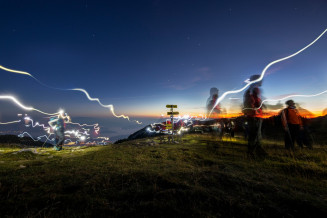News
Sustainable Rural Regeneration Conference

RURITAGE is a European Union Horizon 2020 funded project that created a new paradigm for the regeneration of rural areas by using their unique Cultural and Natural Heritage (CNH) as a driver to boost sustainable development and increase competitiveness.
The two-day conference will include an interactive workshop on rural future scenarios, discussions with leading European researchers and practitioners and an information session for Member States.
Two open-to public sessions will be streamed online in the mornings of 9 and 10 June.
On 9 June, RURITAGE project participants will present the results of their rural regenerations plans and experts from the partner institutions will give talks on how to assess the impact of regeneration actions, the RURITAGE Digital Resource Ecosystem and present the innovative RURITAGE strategy.
Round table discussions about "Sustainable rural development in the European agenda" will also be open to online participants on 10 June, in the morning (CET).
During the first round table on “Rural territories in EU funded projects: inspiration from Local Communities”, RURITAGE territories and members of other projects working on rural development, namely the AURORAL, INCULTUM, Be.CULTOUR and DESIRA projects, will share innovative heritage-led approaches from local communities.
It will be followed by a round table on “Rural Development and regeneration within European Union Agenda”, with members of the SHERPA project, the European Commission and the State Secretary of the Ministry of Culture of Moldova discussing strategic and policy approaches.
About the RURITAGE project
RURITAGE is a European Union Horizon 2020 funded project that created a new paradigm for the regeneration of rural areas by using their unique Cultural and Natural Heritage (CNH) as a driver to boost sustainable development and increase competitiveness. To achieve this, RURITAGE developed an innovative methodology that involves 13 Role Models and 6 Replicators which work on six Systemic Innovation Areas - Pilgrimage, Resilience, Sustainable Local Food Production, Integrated Landscape Management, Migration, and Art & Festivals.
The Role Models (RM) represent 13 successful rural regions which have regenerated their territory by using local cultural and natural heritage and that are representative of the six SIAs. After analysis, the practices of each of the Role Models, including several UNESCO Global Geoparks, have been transferred and adapted to other rural territories that are in the process of building their own heritage-led regeneration strategies – the Replicators. This way, the Role Models support the Replicators by improving their skills, knowledge and capacity building. This process occurs through a co-creation process, where the knowledge and skills of the Role Models are tailored to meet the specific needs and challenges of the replicators. To facilitate the interaction between Role Models and Replicators and engage local stakeholders, 19 Rural Heritage Hubs (RHHs) were established in each RM and Replicator. In these hubs, the RURITAGE community has involved local stakeholders in the formulation of the strategies, ensuring a collective approach in the management, responsibility and ownership of Cultural and Natural Heritage.



